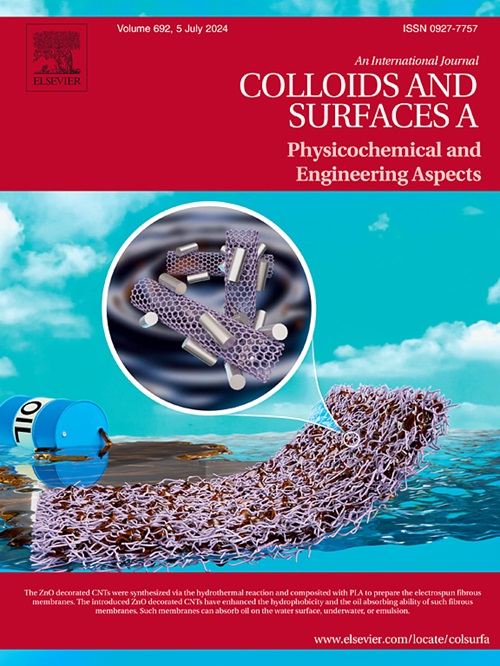纳米镍钴颗粒修饰的 Co-MOF 纳米棒增强了电化学活性
IF 4.9
2区 化学
Q2 CHEMISTRY, PHYSICAL
Colloids and Surfaces A: Physicochemical and Engineering Aspects
Pub Date : 2024-11-04
DOI:10.1016/j.colsurfa.2024.135698
引用次数: 0
摘要
高性能电极材料的设计和制备是超级电容器研究中最广泛的课题之一。通过将钴基金属有机框架(Co-MOF)的三维结构和相容性与金属磷酸盐的高氧化还原活性相结合,采用绿色、高效、安全的共沉淀和电沉积策略,制备了Co-MOF@NiCo-P异质结构复合电极材料,将NiCo-P纳米颗粒均匀地装饰在Co-MOF表面,解决了Co-MOF导电性有限和NiCo-P在泡沫镍上原位生长易聚集的问题。在三电极系统中,Co-MOF@NiCo-P 电极在 1 A g-1 时的比容量为 1389.8 F g-1,在 20 A g-1 时的比容量为 964.3 F g-1。组装后的 Co-MOF@NiCo-P//AC 混合超级电容器装置的能量密度为 54.08 Wh kg-1(22.92 Wh kg-1),功率密度为 825 W kg-1(8250 W kg-1),显示出广阔的应用前景。这项研究为开发高性能电极材料提供了一种新方法。本文章由计算机程序翻译,如有差异,请以英文原文为准。
Enhanced electrochemical activity by NiCo-P nano-particles modified Co-MOF nanorods
The design and preparation of high-performance electrode materials are among the most extensively researched topics in supercapacitor studies. By combining the three-dimensional structure and compatibility of cobalt-based metal-organic framework (Co-MOF) with the high redox activity of metal phosphates, a green, efficient, and safe co-precipitation and electro-deposition strategy was employed to fabricate the Co-MOF@NiCo-P heterostructure composite electrode material, with NiCo-P nanoparticles uniformly decorated on the surface of Co-MOF, addressing the issues of limited conductivity of Co-MOF and the tendency of NiCo-P to aggregate when grown in situ on foam nickel. In a three-electrode system, the Co-MOF@NiCo-P electrode exhibits specific capacities of 1389.8 F g−1 at 1 A g−1 and 964.3 F g−1 at 20 A g−1. The assembled Co-MOF@NiCo-P//AC hybrid supercapacitor device demonstrates energy densities of 54.08 Wh kg−1 (22.92 Wh kg−1) and power densities of 825 W kg−1 (8250 W kg−1), showing promising application prospects. This research offers a novel method for developing high-performance electrode materials.
求助全文
通过发布文献求助,成功后即可免费获取论文全文。
去求助
来源期刊
CiteScore
8.70
自引率
9.60%
发文量
2421
审稿时长
56 days
期刊介绍:
Colloids and Surfaces A: Physicochemical and Engineering Aspects is an international journal devoted to the science underlying applications of colloids and interfacial phenomena.
The journal aims at publishing high quality research papers featuring new materials or new insights into the role of colloid and interface science in (for example) food, energy, minerals processing, pharmaceuticals or the environment.

 求助内容:
求助内容: 应助结果提醒方式:
应助结果提醒方式:


